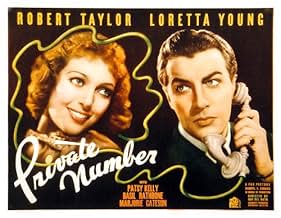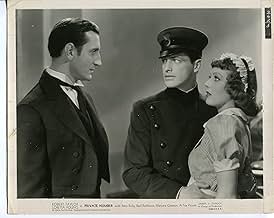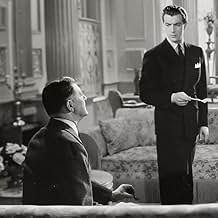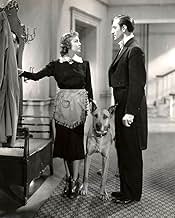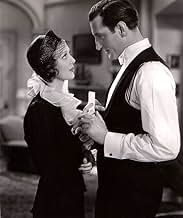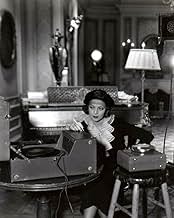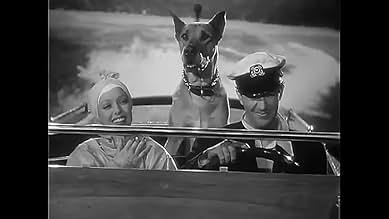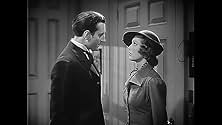A maid secretly marries the son of her wealthy boss.A maid secretly marries the son of her wealthy boss.A maid secretly marries the son of her wealthy boss.
Joe E. Lewis
- Smiley Watson
- (as Joe Lewis)
Alexander Pollard
- Footman
- (as Alex Pollard)
Featured reviews
"Private Number" is a nice little romantic picture about love between the haves and have nots. Representing the latter is lovely Loretta Young, a penniless young woman who decides to apply for a job as a maid and on the other side is handsome Robert Taylor, who happens to be the son of the wealthy couple who employ her. Back home from college for the summer, Taylor presumes Loretta is one of the guests for the party welcoming him home but even after discovering her actual status is bewitched enough by her beauty to still pursue her. Looking on with malice is head butler Basil Rathbone who wants Loretta for himself (his creepy demeanor and malevolent running of the house staff cancels any possibility Loretta would want him). Taylor persuades Young to secretly marry him, planning to announce their marriage after graduation. Trouble is Loretta with child while he is away at school, leading a jealous Rathbone scheme to destroy her relations with the family.
Robert Taylor was only a year into his stardom when this film was made in 1936 and he is once again in the type of role he specialized in at the time, the dashing young heir pursuing a young woman in a Cinderella romance but one that has turns with misunderstandings and mistrust. It's almost the same story as "Small Town Girl", a better picture he also made that year. On loanout here to 20th Century-Fox, the MGM hunk was the undisputed heartthrob of the moment and among the top five box office stars (he would have been unrivalled in the late 1930's had Fox not quickly developed their own matinee idol in Tyrone Power later that year.) Taylor's very good but since Loretta Young was a Fox contractee, her character dominates the story. Gentle and graceful, Loretta was a moderately talented actress very capable in light stories like this one.
The supporting cast is hit and miss. Earthy chatterbox Patsy Kelly steals the film as Loretta's best friend, one of the family's other maids, and the excellent, elegant character actress Marjorie Gateson is quite good as Taylor's mother, taking a shine to Loretta early on and making her a personal maid. Basil Rathbone, alas, was always unsubtle when playing a villain and here he's such a creep it's hard to believe the family would ever believe he was looking out for their best interests. Paul Harvey was also a little excessive as Taylor's father. On the other hand, the underrated Monroe Owsley, is a bit of a surprise. Always cast as untrustworthy dalliances for movie queens (Stanwyck, Mae West, etc.) here he comes across a believable nice guy. We (and Loretta!) should have known better! Kane Richmond, a Robert Taylor type for B movies in that era, has a brief role as the family's chauffeur.
The film audaciously has many parallels with Loretta Young's private life, one wonders if the studio had concocted this little story to put some confusion in the public re speculation about her private romances, as if the public hearing the Hollywood whispers might conclude it was all just a movie plot. Unwed Loretta had just given birth to Clark Gable's child which much of Hollywood suspected but it was never acknowledged until the 1990's when Loretta was near the end of her life. In this movie, Loretta has to fight an annulment so that her baby will remain "legitimate". If that's not nervy enough, how about a scene where Patsy Kelly rhapsodizes about Clark Gable's screen sex appeal to which Loretta whole-heartedly agrees!
"Private Number" is basically just a pleasant but unremarkable romantic drama, the screen equivalent to a paperback romance novel but with beautiful stars and a smooth production to hold your interest.
Robert Taylor was only a year into his stardom when this film was made in 1936 and he is once again in the type of role he specialized in at the time, the dashing young heir pursuing a young woman in a Cinderella romance but one that has turns with misunderstandings and mistrust. It's almost the same story as "Small Town Girl", a better picture he also made that year. On loanout here to 20th Century-Fox, the MGM hunk was the undisputed heartthrob of the moment and among the top five box office stars (he would have been unrivalled in the late 1930's had Fox not quickly developed their own matinee idol in Tyrone Power later that year.) Taylor's very good but since Loretta Young was a Fox contractee, her character dominates the story. Gentle and graceful, Loretta was a moderately talented actress very capable in light stories like this one.
The supporting cast is hit and miss. Earthy chatterbox Patsy Kelly steals the film as Loretta's best friend, one of the family's other maids, and the excellent, elegant character actress Marjorie Gateson is quite good as Taylor's mother, taking a shine to Loretta early on and making her a personal maid. Basil Rathbone, alas, was always unsubtle when playing a villain and here he's such a creep it's hard to believe the family would ever believe he was looking out for their best interests. Paul Harvey was also a little excessive as Taylor's father. On the other hand, the underrated Monroe Owsley, is a bit of a surprise. Always cast as untrustworthy dalliances for movie queens (Stanwyck, Mae West, etc.) here he comes across a believable nice guy. We (and Loretta!) should have known better! Kane Richmond, a Robert Taylor type for B movies in that era, has a brief role as the family's chauffeur.
The film audaciously has many parallels with Loretta Young's private life, one wonders if the studio had concocted this little story to put some confusion in the public re speculation about her private romances, as if the public hearing the Hollywood whispers might conclude it was all just a movie plot. Unwed Loretta had just given birth to Clark Gable's child which much of Hollywood suspected but it was never acknowledged until the 1990's when Loretta was near the end of her life. In this movie, Loretta has to fight an annulment so that her baby will remain "legitimate". If that's not nervy enough, how about a scene where Patsy Kelly rhapsodizes about Clark Gable's screen sex appeal to which Loretta whole-heartedly agrees!
"Private Number" is basically just a pleasant but unremarkable romantic drama, the screen equivalent to a paperback romance novel but with beautiful stars and a smooth production to hold your interest.
This movie has its charms, but it cannot be a "Pre-Code gem," since it came out two years after the Code clampdown kicked in.
It's a little sappy, actually -- it'd have been much better if it HAD been made during the Pre-Code era.
But I do agree that Loretta Young's delightful in it.
It's a little sappy, actually -- it'd have been much better if it HAD been made during the Pre-Code era.
But I do agree that Loretta Young's delightful in it.
Although Private Number is nowhere near as gritty as Midnight Mary, it is beautifully photographed (Fox Movie Channel's print is lovely), and Loretta Young is almost as gorgeous here as she was in that awesome precode classic, certainly more beautiful than she was in the 1940's favorites The Bishop's Wife and The Farmer's Daughter.
Loretta looks especially beautiful with Robert Taylor in Private Number; they make a gorgeous couple. Did they ever have a romance off screen? They looked perfectly suited to one another physically.
Favorite scenes take place up at a lake in Maine, although I can't understand why Loretta's character leaves her friend the maid's character (played with pizazz by Patsy Kelly) alone naked on the shore (friend had lost bathing suit in the water). Loretta, instead of helping her, takes off with Robert Taylor's character on his boat, abandoning her friend. I'd never do that to my friend!. In fact that was the most annoying thing to me about the film: Patsy Kelly was always supporting Loretta and Loretta never did anything to repay her.
Basil Rathbone was downright scary as the butler. He was colder and more frightening here than he was with Greta Garbo in Anna Karenina, and that's saying a lot! I like the way Loretta shudders in the beginning after she first meets the butler. It made me laugh. Listen to your instincts, girl, leave! But no, she's coaxed into staying by Patsy Kelly's character, Gracie.
Monroe Owsley has a small but impressive role as James Coakley, a weak scoundrel on the make. He was to die only a year later after a car crash. Jane Darwell and Billy Bevan put in appearances as servants. Marjorie Gateson did well in the role of Robert Taylor's mother. Also worthy of note is the beautiful large dog, Prince, played by "Hamlet". I would love to have an affectionate dog like that! I wonder who his trainer was? He was adorable. When he puts his paw up on Loretta at one point to comfort her, I sighed "Awwwwww!" 8 out of 10 stars.
Loretta looks especially beautiful with Robert Taylor in Private Number; they make a gorgeous couple. Did they ever have a romance off screen? They looked perfectly suited to one another physically.
Favorite scenes take place up at a lake in Maine, although I can't understand why Loretta's character leaves her friend the maid's character (played with pizazz by Patsy Kelly) alone naked on the shore (friend had lost bathing suit in the water). Loretta, instead of helping her, takes off with Robert Taylor's character on his boat, abandoning her friend. I'd never do that to my friend!. In fact that was the most annoying thing to me about the film: Patsy Kelly was always supporting Loretta and Loretta never did anything to repay her.
Basil Rathbone was downright scary as the butler. He was colder and more frightening here than he was with Greta Garbo in Anna Karenina, and that's saying a lot! I like the way Loretta shudders in the beginning after she first meets the butler. It made me laugh. Listen to your instincts, girl, leave! But no, she's coaxed into staying by Patsy Kelly's character, Gracie.
Monroe Owsley has a small but impressive role as James Coakley, a weak scoundrel on the make. He was to die only a year later after a car crash. Jane Darwell and Billy Bevan put in appearances as servants. Marjorie Gateson did well in the role of Robert Taylor's mother. Also worthy of note is the beautiful large dog, Prince, played by "Hamlet". I would love to have an affectionate dog like that! I wonder who his trainer was? He was adorable. When he puts his paw up on Loretta at one point to comfort her, I sighed "Awwwwww!" 8 out of 10 stars.
In a film that was primarily a vehicle for Loretta Young, I'm guessing that Darryl Zanuck did not want to use his favorite leading man Tyrone Power in this remake of Common Clay. Power and Young did do several films together in the Thirties, but they were either equal vehicles or Power predominated. So Zanuck got the services of Robert Taylor who was the MGM equivalent of Power for Private Number.
Or it's possible that Power also took a look at the script and realized that the part Basil Rathbone had would be a show stealer. Or that Basil Rathbone would make it one as the villainous and lecherous butler is the kind of role Rathbone could really sink his teeth into.
Certainly the part is out of the Snidely Whiplash tradition of villains. Rathbone is the tyrannical butler who rules the house servants with an iron hand including 20% kickbacks on their salaries of which the clueless masters Paul Harvey and Marjorie Gateson know nothing and for reasons I can't figure out no one is telling them or complaining. The only who raises her voice to Rathbone is cook Jane Darwell.
When Loretta Young arrives looking for work, Rathbone in true stage villain tradition is willing to forget the kickback for other considerations. But Young catches the eye of Robert Taylor as Harvey's and Gateson's son. They marry in secret and Young keeps her pregnancy a secret for as long as she can.
With Rathbone playing Iago as well as Snidely Whiplash to the parents they move for an annulment. It all gets rather messy in court, but of course it all works out for the course of true love.
Young is certainly beautiful and who wouldn't fall for her. Only toward the end is Taylor given anything to do that requires any real acting on his part. Patsy Kelly playing Patsy Kelly is also fine as Young's best friend. But the one you will really remember from Private Number is Basil Rathbone.
Or it's possible that Power also took a look at the script and realized that the part Basil Rathbone had would be a show stealer. Or that Basil Rathbone would make it one as the villainous and lecherous butler is the kind of role Rathbone could really sink his teeth into.
Certainly the part is out of the Snidely Whiplash tradition of villains. Rathbone is the tyrannical butler who rules the house servants with an iron hand including 20% kickbacks on their salaries of which the clueless masters Paul Harvey and Marjorie Gateson know nothing and for reasons I can't figure out no one is telling them or complaining. The only who raises her voice to Rathbone is cook Jane Darwell.
When Loretta Young arrives looking for work, Rathbone in true stage villain tradition is willing to forget the kickback for other considerations. But Young catches the eye of Robert Taylor as Harvey's and Gateson's son. They marry in secret and Young keeps her pregnancy a secret for as long as she can.
With Rathbone playing Iago as well as Snidely Whiplash to the parents they move for an annulment. It all gets rather messy in court, but of course it all works out for the course of true love.
Young is certainly beautiful and who wouldn't fall for her. Only toward the end is Taylor given anything to do that requires any real acting on his part. Patsy Kelly playing Patsy Kelly is also fine as Young's best friend. But the one you will really remember from Private Number is Basil Rathbone.
Loretta Young stars with Robert Taylor in "Private Number" from 1936, also featuring Basil Rathbone, Patsy Kelly, Marjorie Gateson, Paul Harvey, Monroe Owsley, and Jane Darwell.
Young plays Ellen, a new employee at the fabulous Winfield mansion, working as a personal maid to Mrs. Winfield (Gateson). She immediately catches the eye of the cruel, lecherous butler Wroxton (Rathbone) who tells her that things will go well for her if she cooperates and is accommodating.
One night, there's a big party going on when who should sweep in but the young man of the house, Richard (Taylor). Hmm...Loretta Young...Robert Taylor. I wonder what happens.
Ellen's best friend on the staff is Gracie (Patsy Kelly). The two of them go out one evening, but Ellen loses all of her money. A man (Owsley) offers her a ride home. He takes her instead to an illegal gambling parlor which is raided. Ellen, who never entered the gambling part, hides behind a door and is caught and arrested. She has to call Wroxton to bail her out. He files that away for future use.
Ellen and Richard find their mutual attraction too strong and start to see one another on the sly. He proposes marriage before he goes away to finish college. She feels him marrying beneath his station is a big mistake for him, and his family will not approve.
Taylor, an MGM actor, must have been on loan to 20th Century Fox. At that point, the studio was still in its infancy - Tyrone Power wouldn't come along until 1936, Richard Greene until 1938, and John Payne even later. I always felt they put too much makeup on Taylor, and he didn't need it. He and Young make a beautiful and sympathetic couple.
Young was simply gorgeous, about 22 years old then. Patsy Kelly to me always yelled her lines. Rathbone was terrific, absolutely hateful, as Wroxton.
Enjoyable.
Young plays Ellen, a new employee at the fabulous Winfield mansion, working as a personal maid to Mrs. Winfield (Gateson). She immediately catches the eye of the cruel, lecherous butler Wroxton (Rathbone) who tells her that things will go well for her if she cooperates and is accommodating.
One night, there's a big party going on when who should sweep in but the young man of the house, Richard (Taylor). Hmm...Loretta Young...Robert Taylor. I wonder what happens.
Ellen's best friend on the staff is Gracie (Patsy Kelly). The two of them go out one evening, but Ellen loses all of her money. A man (Owsley) offers her a ride home. He takes her instead to an illegal gambling parlor which is raided. Ellen, who never entered the gambling part, hides behind a door and is caught and arrested. She has to call Wroxton to bail her out. He files that away for future use.
Ellen and Richard find their mutual attraction too strong and start to see one another on the sly. He proposes marriage before he goes away to finish college. She feels him marrying beneath his station is a big mistake for him, and his family will not approve.
Taylor, an MGM actor, must have been on loan to 20th Century Fox. At that point, the studio was still in its infancy - Tyrone Power wouldn't come along until 1936, Richard Greene until 1938, and John Payne even later. I always felt they put too much makeup on Taylor, and he didn't need it. He and Young make a beautiful and sympathetic couple.
Young was simply gorgeous, about 22 years old then. Patsy Kelly to me always yelled her lines. Rathbone was terrific, absolutely hateful, as Wroxton.
Enjoyable.
Did you know
- TriviaEarly in the picture, Ellen, portrayed by Loretta Young, is discussing a blind date with Gracie, portrayed by Patsy Kelly. Ellen says she hopes the guy can dance. Gracie replies that the last one was a corporal that "was as handsome as Gable, and Gable ain't bad!" Ellen replies, "Oh I'll say not!" This discussion is ironic because when filming Call of the Wild (1935) the year before this film was released, Young had an affair with Clark Gable, leading to the birth of their daughter, Judy Lewis. Audiences at the time didn't realize the irony since this secret affair wasn't made public until years later.
- GoofsJane Darwell is billed as "Mrs. Meecham" but is called "Mrs. Frisby" twice.
- Quotes
Ellen Neal: I'm talking about love Dick. You're talking about marriage. I couldn't marry you because... it would just be a mistake. That's all.
- ConnectionsAlternate-language version of Common Clay (1930)
- How long is Private Number?Powered by Alexa
Details
- Release date
- Country of origin
- Official sites
- Language
- Also known as
- Iz dnevnika jedne sobarice
- Filming locations
- Production company
- See more company credits at IMDbPro
- Runtime
- 1h 20m(80 min)
- Color
- Aspect ratio
- 1.37 : 1
Contribute to this page
Suggest an edit or add missing content

